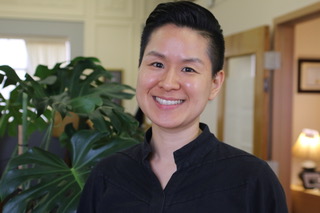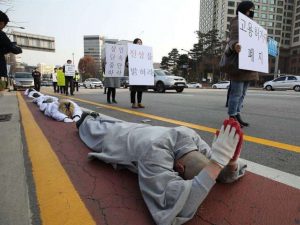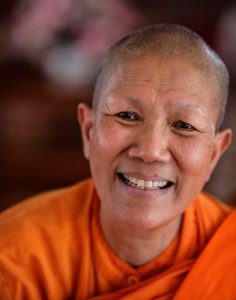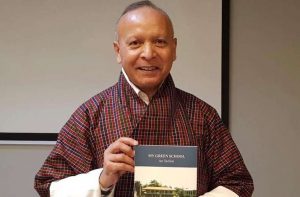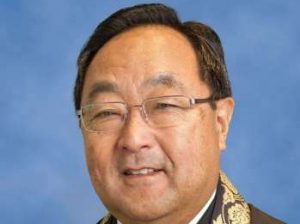
I distinctly remember the first time I met Buptaonim, one of my first spiritual mentors in Korea. Her petite and rotund frame complemented her strong features, which often intimidated her students. She taught with a strong voice, and her explanations were always clear and lucid, free of flowery speech.
During one particularly memorable summer, I had the privilege of studying with Buptaonim in her small room at a residence for retired female clergy. Whenever I entered her quaint room, a plate of fruit or a hot drink would await me on a small, round, glass-covered table. As I would eat the fruit with a small fork, she would occasionally tend to the flowers by her window or clean the floor with a damp rag.
One day, Buptaonim motioned for me to peel the skin off some fruit that she had piled in a wooden bowl. As I began to peel a Korean pear, she said, “Did you know that each fruit has to be peeled differently?” I looked at her as if I understood her words, but proceeded to peel the fruit without putting much thought into it. My only goal was to separate the skin from the fruit.
“Each fruit,” she continued slowly, “follows its own principle.” Some skins are thicker than others and should be peeled more deeply, otherwise, a bitter taste will be left in one’s mouth. Conversely, other skins are thin and should be peeled carefully so that none of the fruit is wasted. “The world is a living scripture,” she would often say enthusiastically. “Don’t relegate the teachings to scriptures or books.” Her words echoed the words of Founding Master Sotaesan: “If people look at this world in the right spirit, there will be nothing in it that is not scripture. When you open your eyes, you will see scripture; when you listen, you will hear scripture; when you speak, you will recite scripture; when you act, you will apply scripture.”
Buptaonim urged me to connect with the world around me through all of my senses, and to view life as a living school in which lessons are imparted. Reframing the world in this manner helped me reimagine relationships between humans and explore the reasons for our transgressions and suffering. Moreover, it pushed me to investigate universal principles and intricate relationships between the universe and its many evolving parts. She would remind me: “Our lives have a profound and inescapable relationship to human relationships and universal principles, so the world is an open scripture.”
This reminds me of a story in the scriptures. One day some disciples argued the pros and cons of current events while reading the newspaper. The Founding Master heard them and said:
Why do you talk rashly about matters that are none of your business? A person with a genuine outlook does not talk lightly about others’ pros and cons. Even while reading the newspaper, the proper conduct for practitioners, and the way to gain true benefit, is to examine carefully in what you read the root cause and the good and bad fruitions that result, taking them as mirrors for one’s future conduct. This is an approach for illuminating the one mind by penetrating all dharmas. For a person who reads newspapers in this spirit, they will become a living scripture and source material for wisdom and merit. Otherwise, one will only become good at critiquing other people’s pros and cons contentiously and glibly, thereby falling easily into the abyss of transgression. You must be extremely careful about this.
(The Doctrinal Books of Wŏn Buddhism, 236)
In life, we all hold numerous preferences, opinions, judgments, and criticisms of certain people and situations. Additionally, we circumvent challenging circumstances and dodge those who bring out the worst in us. During moments of difficulty and anguish, we feel compelled to consult wisdom-filled texts to cope with inescapable external circumstances. However, what if we considered these perplexing external circumstances as living scripture?
In the process, we would understand the principle of cause and effect, and how certain choices result in particular outcomes. We might even utilize these moments to reflect on our intentions and actions. For example, we can inquire why a limitless paradise is opened when one does what is best for oneself while simultaneously doing what is best for others. We can also investigate how someone who harms others in pursuing their happiness ends up committing numerous transgressions and suffering.
A story in the Won Buddhist scriptures recounts a time when a wealthy man who, after saving his poor neighbors by releasing some money and grains in a famine year, kept wishing he would be eulogized for his virtue. The villagers conferred and erected a stele, but the man was still dissatisfied, so he spent more money to erect a new stele and construct a huge stele pavilion. The villagers thought his actions ludicrous, and many criticisms and disparaging remarks were made. Kim Kwangsŏn heard about this and presented it during a conversation session. The Founding Master listened and said:
This is a living scripture about warning people who compulsively seek honor. Although that person did this deed to enhance his reputation, didn’t he lose even his previous reputation, not to mention enhancing it? Thus, a foolish person in seeking honor only damages it instead; a wise person does not intentionally seek to be honored; instead, merely by performing proper actions, great honor naturally comes to him.
(The Doctrinal Books of Wŏn Buddhism, 249)
Life’s challenges often push me to return to the written scripture, to rely on the words of the masters. Buptaonim wasn’t discouraging me from studying the scriptures; rather, she explained to me that the purpose of the written scripture is to provide us with tools to navigate the myriad human affairs and universal principles in the scripture of our lived experience. The written scripture helps us use our minds effectively, which is the fount of blessings and wisdom. They say that each of us is part of the infinite universe, contributing to its perfection. When we view the world as an open scripture, we are partaking in writing our life scripture. Each time we are aware, awake, and mindful, we can change the trajectory of a situation for the better—not only for ourselves but also for others.
References
Committee for the Authorized Translations of Won-Buddhist Scriptures, trans. 2016. The Doctrinal Books of Wŏn Buddhism. Iksan: Wŏn’gwang Publishing Co.
Related features from BDG
Young Voices: Unraveling from Expectations
Beginner’s Mind: Learning to Engage with Buddhism
Learning to Take Refuge
The Center Within
Ven. Pomnyun Sunim: Buddhism in a Divided World




